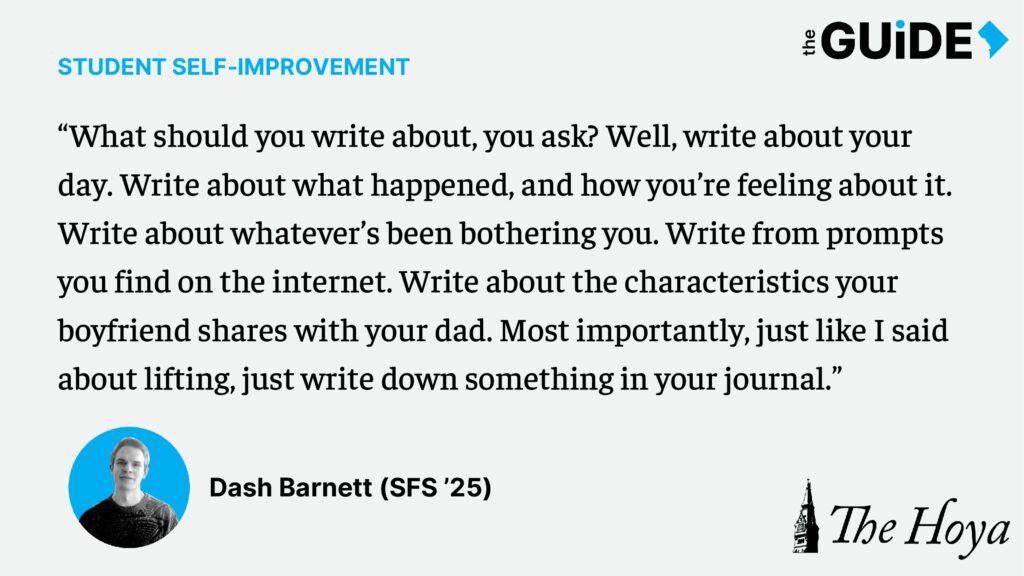You can only get so jacked before people start to assume you’re not in touch with your feelings. To help you develop both the body and the mind, Student Self-Improvement’s second issue will pivot from lifting to journaling, the beautiful practice of putting pen to paper and writing it all out.
If you’re reading this, I figure you probably either journal or think that you should. It’s one of those self-care standards that’s found its way into the cultural milieu as an agreed-upon “good thing.” When your friend mentions it, you might reply with “oh I’ve been meaning to,” “I used to” or “I should.” I agree that you should, but my reasoning goes deeper than your overgrown need for societal approval.
First, the consensus on journaling’s benefits is pretty clear. In 1988, a psychotherapy study revealed that college students who wrote about traumatic events had “long-term decreases in health problems,” visiting the university health center less and missing fewer classes from illness. A 2014 study also connected expressive writing with similar benefits for recovering cancer patients. Besides these miraculous benefits, there are dozens of less sexy studies about measurable improvements in self-reported mental health, mindfulness and even working memory.
Lest we get too close to STEM fields, there are other, more esoteric reasons to journal. As someone who’s maintained the habit for a couple of years, I believe journaling provides a wealth of self-knowledge and personal enrichment.
The din of day-to-day life — especially for a busy college student — can obscure basic “emotional facts,” as psychiatrist Carl Jung would say, papering over our feelings with tests and quizzes until the weekend arrives to drown them in [REDACTED]. It’s easy to lose touch.
Likewise, personal change is often less an eruption than an erosion — a slow process that seems invisible until we wake up one day and notice a massive swath of self-esteem has slid away. Journaling allows us to keep track of our own lives, creating a narrative arc out of what might otherwise just be noise.
Journaling also gives us the bizarre opportunity to read our own life stories. The problems you write about today might look ridiculous a year from now, and you might not even remember them until you read about them. When you journal, you will find it much easier to transfer this long-term perspective into your present-day life as well. You can watch yourself develop over the course of months, or even years, all while checking in with yourself every day along the way.
If that doesn’t sell you, I don’t know what will. But, as I said above, a ton of people want to journal but still don’t. We’ll talk about self-credibility (consistency) in a later issue, but for now, here are some basic steps for putting this habit into practice.
In general, you’ll want to journal on a set interval of days (maybe every day, maybe once a week) at around the same time every day — which is good advice for any habit. You’ll also want to have some idea of how long or how much you’re writing.
For me, this looks like a good ole “One Page Every Day Before Bed,” but you could just as easily set out to write for twenty minutes on Saturday and Sunday afternoons. It’s almost guaranteed that you’ll fall off the wagon from time to time (I know I do), but practice will always make you better.
What should you write about, you ask? Well, write about your day. Write about what happened, and how you’re feeling about it. Write about whatever’s been bothering you. Write from prompts you find on the internet. Write about the characteristics your boyfriend shares with your dad. Most importantly, just like I said about lifting, just write down something in your journal.
By now, you’re hopefully itching to begin — or resume — the wonderful process of journaling. Manifest something good for me if there’s extra space on your page, and stay tuned for the next issue of Student Self-Improvement, where we’ll discuss why you need to get off that damn phone.
Dashiell Barnett is a sophomore in the School of Foreign Service. Student Self-Improvement will appear online and in print every three weeks.















Daefromoutnorf • Feb 24, 2023 at 12:09 pm
Gonna go journal about how tuff this article was, thanks Dash Barnett SFS ‘25 🙏🤞
McLovin • Feb 24, 2023 at 10:19 am
So based king